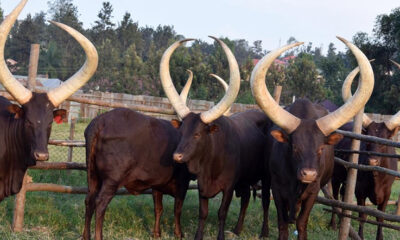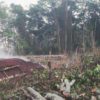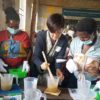Editor
Who is Prof. Ismail Gyagenda, IUIU’s new Rector?
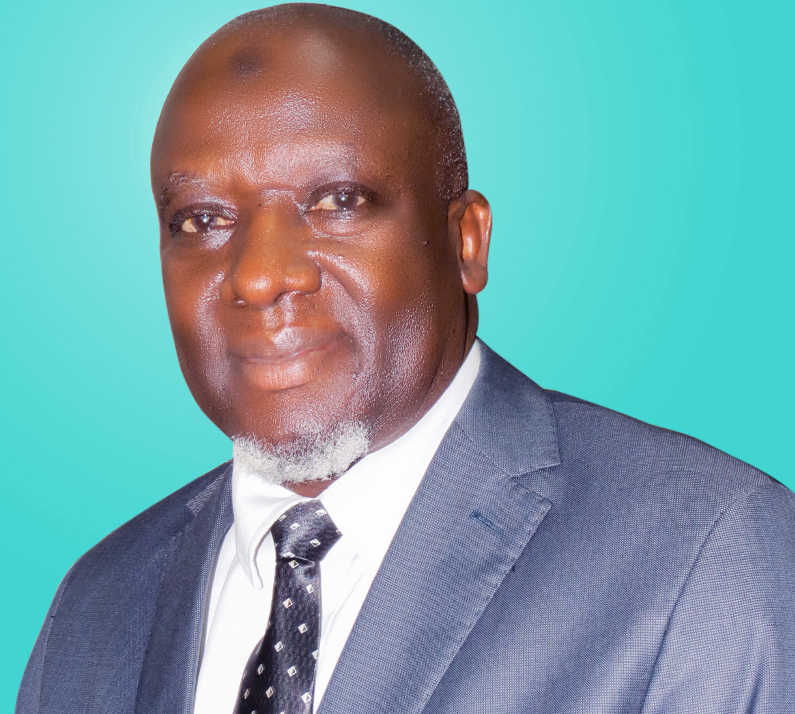
IUIU’s New Rector Prof. Ismail Simbwa Gyagenda
Prof. Ismail Ssimbwa Gyagenda, who until recently, was serving as the Vice Rector of the Islamic University in Uganda (IUIU), was recently appointed as the new Rector of (Administrative head) of Uganda’s second oldest University, following the departure of long-serving Rector Dr. Ahmed Kawesa Ssengendo. Dr. Ssengendo was elevated to the prestigious position as the Assistant Secretary General of the Organisation of Islamic Conference in Charge of Economic Affairs, following the death of former Ambassador Dr. Ahmed Ssennyomo.
The Sunrise’s Henry Lutaaya, held a discussion with Prof. Gyagenda on the road to this assignment and the task ahead.
Qn. First of all Congratulations upon your appointment to this prestigious position. But many people don’t know you. Please tell us a bit about yourself.
Ans. My name is Ismail Ssimbwa Gyagenda. I am an Associate Professor of Education. I was born in Itendero which is 19 miles on Mbarara-Fort Portal road, on June 16, 1956. I was born in Mbarara hospital.
My father is the late Hajj Hassan ‘Kunuuna’ Gyagenda, (he passed away in 1964). He was nick-named Kunuuna by his peers because whenever it came to lunch, he would say, tugende tunuune. He was the Imam of Itendero Mosque. My mom is the late Hadijah Nakitto. She is the daughter of Hajj Ali Bikwarira Kimunyweine, who was the Imam of Kabwohe mosque. He was a Muganda who grew up in Bunyoro, and it’s from there that he got nick-named Kimunyweine, which comes from the term Kunywana – which means ’embracing’ – he was a friendly person.
My paternal grandfather was a Gombolola Chief of Buyanja in Bushenyi (since 1932) – called Amir Mawanda. The Banyankore had nick-named Rutemba rwa Nyamirima (the Rutemba or Chief of Nyamirima). I think he was the first Muluka Chief of Nyamirima, who moved from Masaka around 1910 and went and settled in Ankore, at the invitation of Mbaguta – the Prime Minister of Obugabe, after the British had introduced Buganda’s administrative system in Ankole.
The Omugabe of Ankole encouraged the Baganda to settle in his kingdom and take up leadership positions, arguing that they understood the then new Buganda administrative system that the British had just introduced there, better than his people. So he used the Baganda as the teachers.
For example, our sub county was Kagango Saabaddu. In fact my home was near the Gombolola headquarters of Kagango – but it was called Ssaabaddu. And when I was growing up, there were football matches between Ssaabadu Vs Ssabagabo. Initially I would ask myself, why are they using Kiganda names in Ankole? But I later learnt that the kingdom of Ankole had adopted Buganda’s administrative system.
According to one historian, Mbaguta, the Prime Minister of Ankole then, struck a deal with Baganda Muslims who had been defeated and chased from Buganda and had been exiled in Tanzania, to become chiefs in Ankole.
According to that historian: “Mbaguta told them that you come and settle in here in Bukanga, but give me the chiefs to help me to introduce this new system of administration.” He settled them in Bukanga, in Isingiro district, which is why you find so many Baganda muslims around Bukanga.
My grand father went in that wave. He was not among the Bajungute – those who had fought, but when he heard that when you go to Ankole, you become a chief, he wasted no time. Indeed immediately after arriving in Ankole, he was made a chief.
For many years, my grandfather was the chief of Nyamirima until 1932 when he made the Gombolola chief of Buyanja, which was later renamed Buyonza.
On my mother’s side, her father was a Muganda Chief from Kabwohe. He had married a Mutooro, who was the sister of Abasi Balinda, Sheikh Kiribedda (the father of Hudu Katuramu).
Kiribedda came to Kabwohe as a young boy and was converted to Islam by my maternal grandfather, before he came to Buganda to continue with his religious education. When my grand father died, he became the Imam of Kabwohe masjid. With the held of the community, he established Kabwohe primary school where I had my Primary education from 1962 to 1970.
Qn. Was your family affected by the gruesome June 1979 massacre of muslims at Itendero-Kiziba?
Ans. Oh yes. We were definitely affected. We were definitely affected. It is a traumatic experience that many people will never forget.
I lost the husband of my paternal aunt in that incident. He was called Mwalimu Abdallah Sseggululigamba. He was the grandfather of the now outgoing Kampala Woman MP Nabilah Naggayi Ssempala. He was killed together with his wife and children, by neighbours.
After that trauma, the muslims who survived it, including some of my aunts, moved to Kyazanga. My aunt swore never to return to Itendero. She settled in Kyazanga. My father had passed away back in 1964, but my mother never felt comfortable afterwards and later we brought her to Buganda, partly to escape that traumatic experience.
But I think we have overcome that past. Last time I was there, I said we should forget that. It was motivated by some bad elements – neighbours who descended on neighbours and cut them because of religion. Many were punished by God and others by the government. I heard nasty stories that some of them ran mad afterwards.
Because my father had passed on, my mother found it difficult to raise all seven of us. So she sent me to stay with my grandfather in Kabwohe, where I had my primary education.
After completing my primary education at Kabwohe, I went to Mbarara high for O-Levels and then to St. Mary’s College Kisubi for A-Level.
I joined Makerere University in 1976 for my undergraduate degree in Arts, Literature and Religious Studies – with a concurrent diploma in teacher education.
I got a first class degree and was retained as lecturer for religious studies. Meanwhile, I did Kyeyo Part time work, at Kololo high and Kibuli High, as a teacher of English and Islamic studies.
I left Makerere after I received a scholarship to study Arabic language in the Arabic Language Institute of the University of Ummulqurah in Mecca – Saudi Arabia.
With the help of Uganda’s late Ambassador Ahmed Ssenyomo, I got another scholarship to do my Masters’ degree in Education at the University of Yarmouk in Jordan – to Specialise in teaching English as a foreign language.
When I completed my Masters degree, I returned to Uganda and was one of the 15 founding staff of the Islamic University in Uganda (IUIU) in 1987 as the second university in Uganda after Makerere.
The 15 of us, led by Prof. Twaha Nsereko-Gyagenda (not related to me) were charged with starting the university. I was made the warden for boys but at a university we had to start. My now predecessor Dr. Ahmed Kawesa Ssengendo was named the University Secretary.
We worked hard to ensure the university started and Alhamdullillah, this dream came to reality on February 10, 1988. I was a warden but I was also lecturing in the faculty of education.
I must thank President Museveni for the steadfast support he rendered IUIU since its inception. I remember that there were some people who were opposed to the idea, but he told them not to begrudge IUIU and advised them instead to start theirs. From then many other universities have since started.
In August 1988, left for the USA to further my studies. I did another masters degree in education administration and supervision at the University of the District of Colombia (UDC). I was looking for a PhD place and I got it at Emmory University in Atlanta Georgia. I was at Emmory for my PhD and graduated in 1999. In 2000, I joined Mercer University – Atlanta Branch for my graduate teacher education, to teach teachers who wanted to do a masters, or those who had completed a degree, and wanted to switch to teaching.
I stayed at Mercer for 16 years, starting as an assistant professor. By the time I left, I was an Associate Professor.
In 2016 I returned to Uganda and quite naturally, gravitated towards my home university – IUIU. I was welcomed back by my former colleague and mentor Dr. Ssengendo, and I was appointed Vice Rector Academic Affairs. Incidentally, I assumed office on Feb 10, 2016, a date similar to the one on which IUIU opened its gates in 1988.
Qn. How’s family, and how did you cope with life in America?
Ans. I am married with 6 children – four boys and two girls. The eldest is 31 years and the youngest is 13. my wife, Dr. Wardah Rajab-Gyagenda, is the Head of the Post Graduate programme at the Kampala International University (KIU).
While in America, I worked as a university professor but sometimes, we had to do part time jobs. I was a dish-washer, I was grocery store clark, I was a bus driver for Hertz rental cars.
Although I sometimes don’t put them on my resume, I don’t mind sharing about them. Such jobs teach you life skills and how to interact with the public.
My view is that as long as you have a target, don’t despise any job. Americans have a culture that you don’t despise a dollar because they have to respect the dollar. Unless its against your moral standards, you do (the job). So a lot of people do formal jobs and supplement their income by hustling here and there. Most of the staff in KFC (fast food outlets) and other restaurants are students in universities.
Qn. Coming back to IUIU after 16 full years. It must have been a world of difference, was it not, because IUIU had expanded to 4 campuses, there were new buildings. How did it feel?
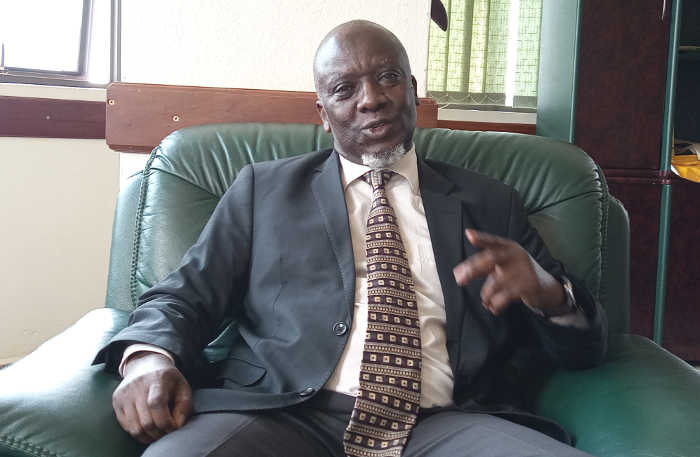
Prof. Gyagenda speaking to The Sunrise from his office at IUIU’s Medical School branch at Kibuli
Ans. By the way in 2010, I returned to Uganda after many years away studying and working in the US. I came and did a sabbatical for one semester. And I was amazed by the changes. Remember I had left in August 1988 and I had never come back until 2010.
So, as I entered the gates at the main campus (Mbale), I remember chocking. I said to myself, Oh my God! A place I left with secondary school buildings is now filled with modern buildings, with palms trees. It was amazing. What I did is that we did a research project together with my wife, Dr. Wardah Rajab-Gyagenda, The Islamic University in Uganda (IUIU): The Pioneers, We went back and asked the people who were important in starting the university in 1987.
We talked to pioneer students, staff to get to know how they felt about being part of the only second university in Uganda after Makerere which was after a very long time.
I said, wait a minute; Muslims are the least educated, they are the least organised, how come they were the first to start a private university? We did that part for that one year, but we intend to do expand the scope to cover IUIU’s journey over the past 32 years or even beyond, tracing how the idea of starting an Islamic University in Uganda was born at LaHore in Pakistan in 1974.
Qn. Before you were appointed as the new Rector, what achievements did you record over five years as Vice Rector of IUIU?
Ans. I have tried to work closely with my Rector Dr. Ahmed Kawesa Ssengendo, supporting him in the academic arena. I believe we have continued to grow in that area. When I came, we had about 7000 students, now we have about 10,250. Had it not been COVID, we could perhaps have had more.
Secondly, we have started PhD Programmes which are fully recognised by the National Council for Higher Education (NCHE).
Qn. Did all of them start during your time?
The one of Education, yes. PhD in Education started about 2 years ago. But the one in Religious studies had been there but the Curriculum has been revived and has been fully recognised by the NCHE. The PhD in Sharia, PhD in Islamic Studies and Arabic language are now fully recognised by the NCHE.
We are soon starting the PhD in Business Administration. We are also making final revisions in the curriculum for the PhD in Islamic Banking and Finance so that the NCHE can certify it.
So there has been a lot of growth from just two faculties and two programmes in 1988 I.e (Bachelors of Education and Bachelors of Islamic Studies) to now over 90 programmes. These range from Certificates to Diplomas to Undergraduate, Masters and PhD programmes in seven faculties offered at 4 campuses. So we are training Sheikhs, as well as bankers, teachers, doctors and administrators. So we have demystified the myth that IUIU simply teaches Arabic language.
Qn. What is your vision for IUIU?
The strategic vision of IUIU is to become a centre of excellence. We are increasing our research. In fact we got some money from the Islamic Development Bank to develop our research capacity. The idea is that every lecturer should publish at least one article per year.
One of our main challenges is that 90% of our operational income comes from tuition. This is not healthy. Now COVID has exacerbated it and made it even more glaring. Without students, there is no money.
Qn. How is the situation on other universities where you have worked?
The US is a different animal. We cannot compare ourselves to them. They have a lot of money. A lot of the universities are state-owned and funded. The private universities can suffer in situations like these, but they have endowments (investments) from which they draw from in times of hardships like now. For example, Harvard University has an endowment worth over US$48 billion. We also want to expand the endowments for IUIU.
Right now we have one endowment – King Fahad Plaza – along Kampala road. President Museveni gave us another piece of land measuring seven acres, which is adjacent to the newly constructed Shoprite in Nsambya. We are working with the Islamic Development bank to develop it. We hope that it will become our second endowment. Many international universities invest n the stock exchange, buy bonds so that in times of trouble, they have a fall back position. At IUIU, we have had to cut our salaries to survive.
The good news is that hopefully COVID is going and we believe that we shall stabilize even in a staggered manner.
Engage the Alumni
Going forward, our aim is to have other sources of income. The immediate task is to work with our alumni. Over the past 32 years, IUIU has produced over 32,000 graduates. They are all over the world. Some of them are Ministers, MPs, judges, and many are in the business community.
Qn. What do you want to tell them?
We want to share with them our achievements and challenges. And they are waiting. We have talked to some of them and they say, please call us. Very soon, a Directorate of Alumni engagement is going to be established. It will be at the same level as other directorates such as the directorate of research.
Their job 24/7 shall be to engage the alumni; show them that we need support here and there and when they give, we shall commit to the highest degree of transparency. People will respond if they know that the money they give is used wisely and prudently.
So I really call upon our alumni that when this office is opened, please feel free to engage as much as possible.
By the way, Americans are very astute about this. I graduated from Emmory in 1989. But every week I receive an email from them, 21 years later. They believe that alumni are strong stakeholders.
Qn. Have you ever given back to them?
Ans. Oh yes. Once in a while I give them US$100, US$50. After all they gave me free education. I never paid a penny.
Qn. Don’t you think you’ve come at the wrong time when COVID has disrupted everything?
Ans. I am motivate by what we have managed to achieve. Of course I am apprehensive given the fact that COVID has devastated our university economy, but we are very optimistic people. Muslims are very optimistic people.
Some people think that muslims are fantalistic people, (because we say that what happens is out of God’s will) but this is the wrong interpretation of Islam. Even prophet Muhammed (SAW) is quoted to have said; “Even if you think that it is the day of judgement, but you have a seed in your hand, plant it.” That is the proper definition of hope; hope against all odds. And that is our philosophy at IUIU. Even when COVID came, we never stopped.
Comments



